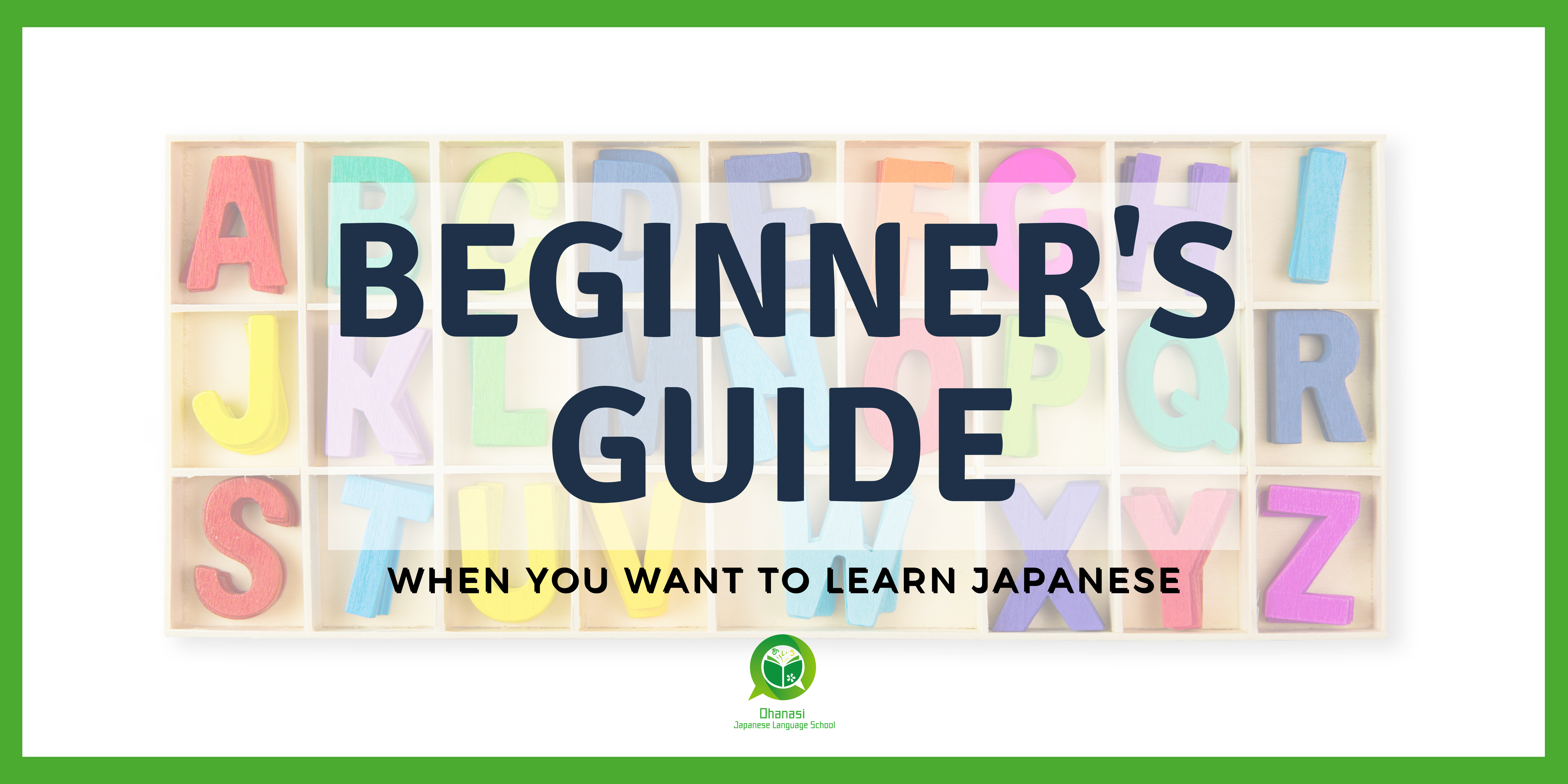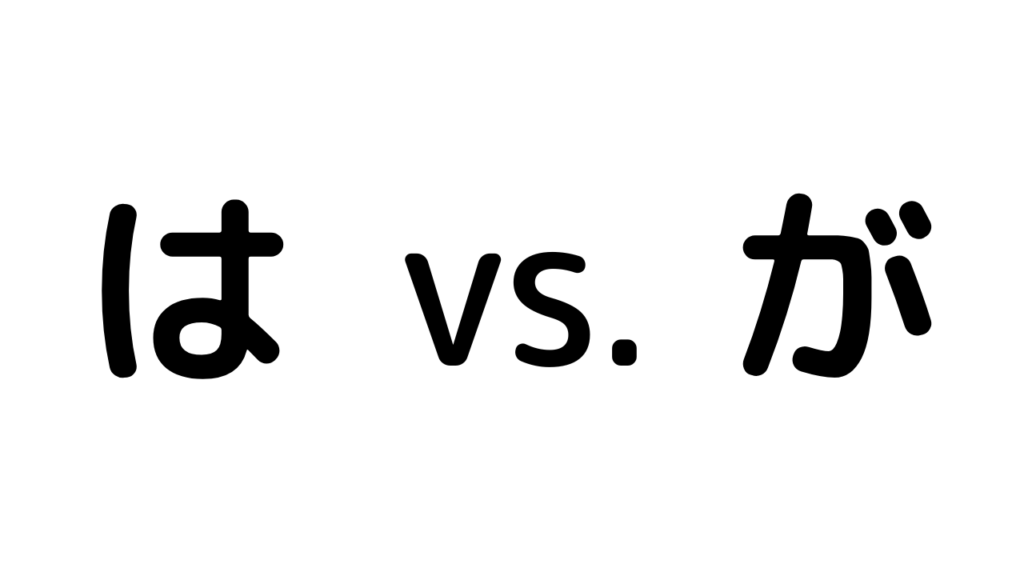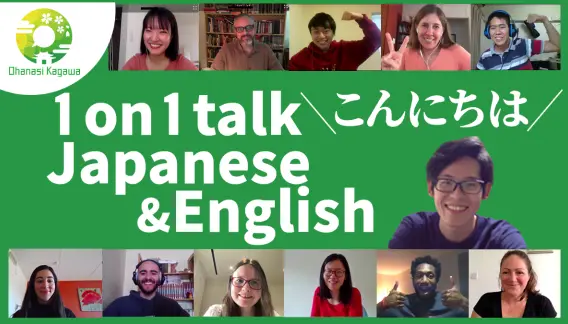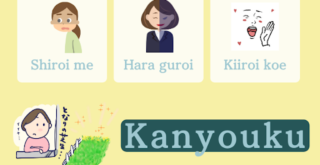
Learn Japanese
Ohanasi Kagawa
Ohanasi Japanese Language School
2023.07.04
Let’s learn Japanese While Having Fun: Interactive Online Japanese Lessons for Beginners
Where should I start when I want to learn Japanese? So where do I start? There are many books and websites that summarize how to learn Japanese, and you may be at a loss as to how to start. In this article, we will introduce our online Japanese lessons to help you learn Japanese while having fun. Let's master Japanese in a fun and interactive way through our online lessons designed for beginners! Advantages of Learning Japanese Online The benefits of learning Japanese online This section details the benefits of learning Japanese online. - Flexible learning schedule- Cost-effectiveness- A wide variety of teaching materials and methods We will focus in particular on the ability to learn at your own pace, cost-effectiveness, and the wide variety of teaching materials and methods. Flexible learning schedule The biggest advantage of online Japanese lessons is that you can learn at your own convenience. For example, you can study on weekends or evenings even while working full time. One of the main reasons why it is possible to balance work and study at the same time is that you can use your commuting time and other spare time. Even a 10-minute daily time slot can add up to 5 hours of learning if you continue every day for a month. In addition, since you can access and study from home, you are not restricted by time or location. You can take classes even late at night or early in the morning, allowing you to study intensively. Furthermore, since the system is flexible enough to accommodate sudden schedule changes, it is easy to continue learning. Online Japanese language lessons are a very convenient way to learn at your own convenience and without strain. Cost-effectiveness How about the cost of learning Japanese now? Next, we will discuss cost-effectiveness. Online lessons are more cost-effective than traditional classroom-based lessons. One specific reason is the savings in transportation and materials costs. You don't have to pay for commuting to school because you can participate from home. The cost of materials is also reduced by the online offerings. Another advantage is the wide variety of class options. Through the Internet, you can access classes all over the world. In addition, one-on-one tutoring is available so that each learner's needs can be met. Online lessons can provide effective learning at an affordable price. A wide variety of materials and methods Next, let's look at the element of abundant teaching materials and methods. Online Japanese language learning utilizes a wide variety of materials and methods. For example, listening practice using video and audio materials may be easy to imagine. Activities previously conducted in books are now also digitized, and students can study grammar and vocabulary using online reference books and textbooks. Interactive learning tools and games are another online feature. You can learn effectively while having fun as you play. This allows for a flexible curriculum and learning that fits your own learning style. The diversity of online Japanese language learning provides an efficient and attractive learning environment for learners. How to proceed with online Japanese language lessons for beginners Advice for beginners There are many advantages to learning Japanese online, aren't there? However, some of you may be worried that online lessons may be difficult for beginners. Some of you may feel uneasy about this. Here we will explain how to proceed with online Japanese lessons for beginners and how to learn effectively. - Learning basic expressions- Forming a study habit- Using interactive lessons Let's take a look at the details! Learning Basic Expressions There are a lot of expressions! First, let's look at learning basic expressions. The first basic Japanese expressions that beginners should learn are greetings and self-introductions, simple daily conversation, and basic grammar rules. Greetings and self-introductions are the foundation of the Japanese language. You will also learn about phrases commonly used in daily conversation. Next, it is also important to understand basic grammar rules and learn how to conjugate particles and adjectives. As a learning method, we recommend that you practice repeatedly by using teaching materials, online lessons, and learning applications. It is also effective to talk with native speakers and take advantage of opportunities for a language exchange. Be proactive in your practice and make an effort to increase the number of opportunities to use Japanese. By acquiring these basics, you will be able to build a foundation for learning Japanese. Forming Study Habits Your habit makes your life. Next, we will tell you about forming study habits. In order to maximize the effectiveness of your Japanese language study, it is important to form study habits. Set aside a certain amount of time each day to study, set goals, and check your progress. To make learning fun and engaging, choose topics and themes that interest you and make use of learning content and games. Plan ahead and pay attention to time management and self-motivation. It is also a good idea to support your learning through community and interaction with fellow learners. By establishing a learning habit, you will be able to enjoy and effectively learn Japanese. Using Interactive Lessons Interactive language exchange event Finally, let me explain about interactive lessons: Ohanasi Kagawa provides opportunities to teach each other Japanese and English through interactive language exchange events. Participation is available by making a reservation through the website. Participants can learn practical expressions and grammar usage to improve their language skills. Ohanasi Kagawa's interactive lesson is a valuable opportunity for participants to improve their Japanese language skills while gaining confidence. Ohanasi Kagawa's language exchange events allow participants to learn Japanese at their own pace, efficiently, and while having fun. It is the perfect way for beginners who want to learn Japanese. So, let's start learning Japanese together! 【For Japanese Learners】 Limited to 10 people Free Consultation & Japanese Lesson ↑Click to the website! We are organizing a free Japanese language consultation & free Japanese lesson for Japanese learners. “Even though I’m studying Japanese, I can’t speak it.” “I don’t know how to study Japanese.” “I’m worried that I can’t see any progress.” Our Japanese Language Learning Counselors would be happy to listen to the concerns of such beginner- or intermediate-level Japanese language learners and advise them on how to learn Japanese and solutions that suit their needs. ※Due to the limited time of our Japanese Language Counselors, we limit the number of participants to 10. We at Ohanasi Kagawa are currently hosting an online Japanese-English language exchange event on weekends.However, we have noticed that there are many people who want to participate but are not confident enough in their Japanese to do so. We are holding this free Japanese language study consultation in the hope that we can help Japanese learners find hints to help them move forward.You can book through the calendar below, and we will send you a link for the free counseling by e-mail.If you’d like to take a Japanese lesson, you can take it for free during this time. Book a free counseling and trial lesson >>>

Learn Japanese
Japanese Culture
Ohanasi Kagawa
Ohanasi Japanese Language School
2023.07.04
Let’s have fun learning the Japanese alphabet! Beginner’s Guide When you want to learn Japanese…
When you want to learn Japanese, the first thing you may encounter is the alphabet. In this article, we will show you how to learn the Japanese alphabet effectively. Starting with the basics of hiragana and katakana, we will explain in detail, including memory techniques and practical application. Read to the end and you will be able to enjoy learning the Japanese alphabet! What is the Japanese alphabet? Let's learn the basics of hiragana and katakana! (How to learn alphabet in Japanese) How to learn alphabet in Japanese First of all, we will explain the basics of the Japanese alphabet. The Japanese alphabet includes hiragana and katakana. Both share the fact that they are derived from Kanji characters, but while hiragana is a broken down form of Kanji, katakana is a character made from a part of Kanji. Characteristically, one sound is fixed to one character. Hiragana and katakana exist as 50 sounds each, corresponding one to one. For example, "a'' in hiragana and "a" in katakana have the same sound. Some of the characters have a dotted or circled sound that becomes a muddled or semi-muddled sound. The difference between hiragana and katakana is that hiragana is the basis of the Japanese language, while katakana is often used for foreign words. In terms of the order of study, hiragana will come first. From here, hiragana and katakana will be explained respectively. Characteristics and basics of hiragana ( Japanese hiragana and katakana guide) Elementary school education Let us explain the characteristics and basics of hiragana. Hiragana is one of the characters used to write the Japanese language. Originally, men such as aristocrats and priests used katakana to write kanji in shorthand, but in the Heian period (794-1185), women and the general public began to write characters as well, and simple characters were needed. Therefore, hiragana developed from a broken form of kanji. Today, hiragana is mainly used in elementary school education and in books for children, and is also utilized along with kanji in daily life. As for the writing style, when writing with a brush, it is expressed in three movements: dots, horizontally, and vertically. However, with the spread of keyboard input, there is a trend where the correct stroke order, stop (tome), upward brushstroke (hane), and sweeping (harai) are becoming less important. Features and basics of katakana (Japanese hiragana and katakana guide) What are the characteristics and basics of katakana? On the other hand, what are the characteristics and basics of katakana? Katakana has its origins in an ancient Japanese writing system called Manyogana. In the Middle Ages, a mixed writing system of kanji and kana became the mainstream, and a system similar to the modern one was established in the Meiji era. Katakana is mainly used to write foreign words, technical terms in science and technology, and product names. It is also sometimes used to express words without kanji characters to enhance readability. All writing styles consist of straight lines and angular curves, and like hiragana, the order and direction of lines is important. However, the writing area is narrower than that of hiragana, and the characters are thinner toward the tips. How to learn the Japanese alphabet: effective practice methods (Japanese writing system basics) ow can we effectively practice the Japanese alphabet? How can we effectively practice the Japanese alphabet? Here are some effective ways to learn hiragana and katakana. - How to Practice Hiragana and Katakana - Mnemonic techniques for learning the Japanese alphabet effectively We will explain each of them in detail. How to practice hiragana and katakana There are some effective ways to practice hiragana and katakana First, here are some effective ways to practice hiragana and katakana. - Use of practice sheets By using hiragana and katakana practice sheets, you can learn how to write them correctly. The practice sheets can also be used for writing and reading practice, so you can broaden the scope of your practice. - Use of Online Resources Online resources can help you practice more efficiently. For example, by using websites and apps for learners of Japanese, you can practice using audio and example sentences. - The importance of repeated practice Hiragana and Katakana practice requires, above all, repetition. By writing and reading the same characters over and over again, you will be able to remember them accurately. It is also important to divide your practice into intervals so that you can increase the amount of practice. By practicing hiragana and katakana with the above perspectives in mind, you will learn how to write and read them accurately. How to memorize Japanese alphabets effectively (how to memorize Japanese alphabets) How to memorize Japanese alphabets Here are some memory techniques to help you memorize hiragana and katakana effectively and enjoyably! - Storytelling method By creating a story and having hiragana and katakana appear in the story, you can easily remember them. For example, by creating a story in which a "red rose" appears, you can memorize hiragana "a", "ka", and "i", and katakana "ba" and "la". - Associative Memory Method For hiragana and katakana, keywords that match the image of each word are set to make them easier to remember. For example, "a" is the color "aoi", "so" is the drink "soda", and so on. - The importance of periodic review Even if you think you have memorized a word, you may forget it over time. In particular, alphabets that are not used very often are rapidly forgotten. Therefore, it is important to review hiragana and katakana regularly to make them stick. For example, reviewing them for 10 minutes every day will help you remember them better in the long run. By being aware of the storytelling method, the association memory method, and the importance of regular review as described above, you can learn hiragana and katakana in a fun and effective way! Practice: Deepen your learning with activities using the Japanese alphabet! (top Japanese language websites) What are top Japanese language websites? From here, let's work on more practical learning! Here are some practical activities using Japanese alphabets. - Let's read Japanese sentences - Let's write your own Japanese sentences! We will explain how to enjoy and deepen your learning through reading and writing. Let's read a Japanese sentence Reading Japanese books... First, let's actually read some Japanese sentences. For reading short sentences, we recommend simple Japanese books, Japanese websites, and Japanese social networking posts. - For simple Japanese books, there are picture books and learning materials for children. They use basic grammar and vocabulary and are rich in pictures and illustrations. - You can read news and blogs on Japanese websites. Some sites are geared toward beginners, and you can improve your reading skills through short articles. - In Japanese social networking sites, you can read Japanese on Twitter and Instagram. You can learn real and colloquial expressions from users' posts and comments. Combined, these methods allow you to learn hiragana and katakana in a practical way. Build your foundation with simple Japanese books and deepen your learning through actual content on websites and social networking sites. By choosing topics that interest you, you will be more motivated to learn. Try writing your own Japanese sentences Try writing your own Japanese sentences! Finally, try writing your own Japanese sentences! You can learn how to use hiragana and katakana practically by writing your own Japanese sentences, such as self-introductions, daily conversations, hobbies and interests, and so on. In self-introductory sentences, you will express your name, hometown, hobbies, etc. in concrete terms. 「こんにちは、私はXXと申します。日本出身で、音楽や旅行が好きです」(Hello, my name is XX. I am from Japan and I like music and traveling.) In everyday conversation, imagine a conversation or scene with a friend and express what you want to say in a sentence. Write greetings, expressions of appreciation, questions and opinions. 「おはよう!今日は予定がある?」(Good morning! Do you have plans today?) or 「昨日の映画、面白かった!」(I enjoyed the movie last night!) We recommend using apps such as Twitter, Instagram, HelloTalk, etc. If you are writing about your hobbies and interests, write about what you like and are interested in. Try using specific expressions such as, 「最近は料理に興味があり、新しいレシピに挑戦しています」(Lately I've been interested in cooking and have been trying out new recipes. ) You may get a reaction from someone! Through this kind of practice, you may actually want to talk to Japanese speakers! Ohanasi Kagawa hosts free online language exchange events on weekends. English and Japanese learners are paired one-on-one and switch the language they speak every 15 minutes. If you are at all interested, please check out the details! In this article, we have explained in detail the basics of hiragana and katakana, the Japanese alphabet, as well as effective learning methods and practical activities. Use these methods to have fun learning the Japanese alphabet! 【For Japanese Learners】 Limited to 10 people Free Consultation & Japanese Lesson We are organizing a free Japanese language consultation & free Japanese lesson for Japanese learners. “Even though I’m studying Japanese, I can’t speak it.” “I don’t know how to study Japanese.” “I’m worried that I can’t see any progress.” Our Japanese Language Learning Counselors would be happy to listen to the concerns of such beginner- or intermediate-level Japanese language learners and advise them on how to learn Japanese and solutions that suit their needs. ※Due to the limited time of our Japanese Language Counselors, we limit the number of participants to 10. We at Ohanasi Kagawa are currently hosting an online Japanese-English language exchange event on weekends.However, we have noticed that there are many people who want to participate but are not confident enough in their Japanese to do so. We are holding this free Japanese language study consultation in the hope that we can help Japanese learners find hints to help them move forward.You can book through the calendar below, and we will send you a link for the free counseling by e-mail.If you’d like to take a Japanese lesson, you can take it for free during this time. Book a free counseling and trial lesson >>>

Learn Japanese
Japanese Culture
Ohanasi Kagawa
Ohanasi Japanese Language School
2023.07.01
【ADVICE to Japanese learners】Vol.1/ Do you lend your ears to Japanese friends?
Do you have some Japanese friends? If you do, I believe that today's topic is useful when you talk with them !! Hi!! I'm Satomi in Ohanasi Japanese Language School.Today, I'll teach you about what Japanese people feel is important in the conversation. Do you listen attentively to what your friends saying? I wonder if you listen attentively when you talk with your friends. You might think, “Of course, I always listen attentively.” Do you know that there are 2 kinds of words for “listen” in Japanese? They are “聞く” and “聴く”. I think you can communicate better with Japanese people if you understand the difference in their meanings. 【聞】and【聴】 First, there are 【門】and【耳】in the Kanji of 【聞】. On the other hand, there are 【耳】,【目】,and【心】in 【聴】, right? The difference between 【聞】and 【聴】is whether if there are 【目】【心】.(【目】means “eyes”.【心】means “heart”) In other words, 【聴く】means “listening with your eyes and heart”. It’s interesting, isn’t it? Do you know the word 【傾聴(けいちょう)】? For Japanese people it is very important. What does “listening with your eyes and heart” mean? People say, it’s important to listen attentively to others when you talk with others.(It means 【傾聴】). What’s 【傾聴】? The Kanji 【傾】in 【傾聴】is called 「かたむける」.「かたむける」means “to focus on certain things” too. That’s why, 【傾聴】means “listening to what the other person is saying mindfully”. The purpose of 【傾聴】is to understand the other person well while focusing on what he/she wants to say . You can make better relationships not only in special situations, but in daily situations, if you can do 【傾聴】. For this reason, many Japanese people are learning 【傾聴】. I'll teach you 5 points of 【傾聴】 that you can use easily from today in the next blog^^ このブログを日本語でよむ

Learn Japanese
Ohanasi Kagawa
Ohanasi Japanese Language School
2023.06.24
【Nihongo-Level ★★☆☆】Do you know how to use”~し、~し” correctly?
I think... many Japanese learners cannot use this grammar correctly . How about you? Hi!! I'm Satomi in Ohanasi Japanese Language School.Let's practice this grammar together★ QUIZ1:Are these sentences correct, or in correct? 1.私の彼、おもしろいだし、親切し、、、もう最高なの! WATASHINO KARE, OMOSHIROIDASHI,SHINSETSUDASHI,MOU SAIKOU NANO!! My boyfriend is so fun , kind and wonderful !! 2.A「ねぇね。マック行こうよ!安いし早いしおいしいし!」 "NE-NE. MAKKU IKOUYO!! YASUISHI HAYAISHI OISHIISHI !!" Hey, let's go to McDonald's !! It's reasonable, fast, and delicious !! B「えぇ~?今日もまた行くの?昨日も行ったじゃん…」 "EE-, KYO-MO MATA IKUNO? KINOUMO ITTAJAN..." Seriously? We go there today too? We went there yesterday... 3.母「あなた!昨日、コンビニで万引きしたっていう話、本当!?」 "ANATA !! KINOU, KONBINIDE MANBIKISHITA TTEIUHANASHI, HONTOU!?" I heard that you stole something in a convenience store, right?" 息子「は?オレは何もしてないだし、知らないだし、関係ないだよ!」 "HA? OREHA NANIMO SHITENAIDASHI, SHIRANAIDASHI,KANKEINAIDAYO!"Are you kidding me? I didn't do anything, know anything, and have nothing to do it. QUIZ1:Answer 1. ✕ 2.〇3. ✕ 1.私の彼、おもしろいし、親切だし、、、もう最高なの! 2.A「ねぇね。マック行こうよ!安いし早いしおいしいし!」 B「えぇ~今日もまた行くの?昨日も行ったじゃん…」 3.母「あなた!昨日、コンビニで万引きしたっていう話、本当!?」 息子「は?オレは何もしてないし、知らないし、関係ないよ!」 Did you know everything?Let's practice the grammar from now on !! How to use this grammar? ★POINT★名詞(Noun)& な形容詞(なadjective)⇒~だし ★POINT★There are some conjugation in verb.*It's better to match the form in one sentence.ex ✕知っていますし、分かるし… 〇知っていますし、分かっていますし… QUIZ2:Practice 1.このスカートは色が( )、好きなデザインだし…買います!aあるし bあかるいだし cきれいし dきれいだし 2.A「どうしてこの会社に入ったんですか。」 B「残業も( )、ボーナスも多いですし、それに実家から近いですから。」aなかったし bないですし cあるだし dありますし※"~し~し、それに…" is often used when it comes to describing a reason. 3.私の祖父は、タバコをたくさん( )、お酒をたくさん( )、健康が心配だ。a吸うし/飲むし b吸いますし/飲むし c吸わないし/飲まないし d吸ったし/飲んでいるし QUIZ2:Answer 1.このスカートは色が( dきれいだし )、好きなデザインだし…買います! 2.A「どうしてこの会社に入ったんですか。」 B「残業も( bないですし )、ボーナスも多いですし、それに実家から近いですから。」 3.私の祖父は、タバコをたくさん( a吸うし )、お酒をたくさん( a飲むし )、健康が心配だ。 You did it !!I hope you can use this grammar in daily conversation next^^ このブログを日本語でよむ

Learn Japanese
Japanese Culture
Ohanasi Kagawa
Ohanasi Japanese Language School
2023.06.01
How do you say “Do you speak Japanese?” in Japanese? Explaining you the grammar of “GA” and “HA”. is also explained.
What should you do when you want to ask someone if they speak Japanese? "Anata wa nihongo wo hanashimasuka?" is Japanese for "Do you speak Japanese?" For "Can you speak Japanese?", you can say, "Anata wa nihongo wo hanasemasuka?" Did you notice that there is a one-character difference between "do" and "can"? It is interesting how just one letter can change the meaning of a word. In this article, I will introduce the phrase "Do you speak Japanese? In addition, I will discuss the difference between the particles "HA" and "GA", as well as the difference between "do you?" and "can you?" Read to the end, and you will be able to ask questions in Japanese! Is "Do you speak Japanese?" means, "Do you speak Japanese?" The answer is, "あなたは、日本語を話しますか?" This is how to read it.あなた (anata) は (wa) 日本語(nihongo) を(wo) 話します(hanasimasu) か(ka)? Let's look at the points. (1) Japanese interrogative sentences end with "ka? at the end. (2) In Japanese "You (do) speak Japanese" ・you = あなた(anata)・(do) = は(wa)・speak Japanese 日本語を話します(nihongo wo hanasimasu): a polite version of 話す(hanasu) + Question "ka?" The diferent between ”Anata WA nihongo wo hanasimasu” and “Anata GA nihongo wo hanasimasu” Now lets look at the difference between, "Anata WA nihongo wo hanasimasu" and "Anata GA nihongo wo hanasimasu." The particles "は (WA)" and "が (GA)" are used according to what part of the sentence you want to emphasize. 「は(WA)」 ・The information you want to convey comes at the end. (eg. 新しい先生は山田先生です/ atarashii sensei wa yamada-sensei desu) ・Adjectives (eg. 桜の花はきれいです/ sakura no hana wa kirei desu) ・Noun sentences (eg. 明日は水曜日です/ ashita wa suiyoubi desu) 「が(GA)」 ・The information you want to convey comes at the beginning. (eg. 新しい先生が山田先生です/ atarashii sensei ga yamada-senseidesu) ・Dependent clause (eg. 私が起きたとき、母はいませんでした/ watashi ga okitatoki, haha wa imasendesita) ・Noun-modifying clause (eg. 猫が汚したソファは捨てました/ neko ga yogosita sofa ha sutemasita) "あなたは(WA)日本語を話しますか。" is trying to convey the "speak Japanese" part. On the other hand, "Do you (GA) speak Japanese? emphasizes the fact that it is "you" who are speaking Japanese (It's similar to a question: Are you the person who speak Japanese?). Therefore, "あなたは(WA)、日本語を話しますか?" is more appropriate. The difference from "Can you speak Japanese?" So far, we have summarized how to ask "Do you speak Japanese?" in Japanese. Then what about "Can you speak Japanese? The word that follows the verb in Japanese changes between can and do. The "話します" in "あなたは日本語を話しますか?" is: 話す(hanasu) = 動詞(speak) +ます(masu) = Polite (1)In case of “do” for 話す(hanas"u") Instead of the “i"、 it becomes 話し(hanas"hi")+ます(masu) (2)In case of “can” for 話す(hanas"u") Instead of the "e"、 it becomes 話せ(hanas"e")+ます(masu) If you want to learn Japanese In Japanese, "Do you speak Japanese?" is "Anata was nihongo wo hanasimasuka?" There are many things you can learn just by memorizing one Japanese phrase. In this article, we have explained the basic grammar, but you might not be able to use it right away. Also, Japanese might not use correct grammar. To learn to use them in conversation, it is a good idea to actually use them with Japanese people. However, there are some people who do not have Japanese friends or who find it difficult to go to Japan. That is why Ohanasi Kagawa holds online exchange events between Japanese and English learners. Japanese learners and English learners are paired, and you can switch languages every 15 minutes. This creates an environment where you can teach and learn from each other. This is a fun event for those who want to practice what they have learned. Come and have to see! Ohanasi Kagawa Website >>> That said, you might still not be confident in your Japanese speaking ability. You’re not sure how to study Japanese. For people like that, we are currently offering free Japanese language consultation and free lessons for a limited number of 10 people each month.You don’t know how to study Japanese. If you are interested in taking Japanese lessons to solve what you don’t understand, please feel free to join us.If you are interested, please click the URL or image below. Click here to see more details >>>






